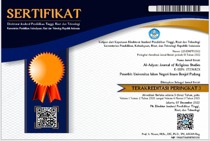The Ecological Dimension of Confucian Religion: Perceiving Human-Nature Relation in the Anthropocosmic Principle
Abstract
The religious discourse has been dominated by the paradigm of world religions especially the Abrahamic religions like Islam and Christianity, shaping the way religion being understood and associated with other issues. Its strong emphasis on the ultimate being called God has resulted in commonly accepted categories of what could be counted as religion or more religious. It then brings a strict distinction between the sacred and the profane or secular. The issues of ecology, economics, politics, etc., therefore, are often dissociated from religions. This paper aims to challenge that paradigm by promoting Confucian distinctive ways of being religious which have been commonly perceived as having much to do with humanity or social matters. This paper, by using literature study as the method of research, further show the important significance of Confucian religiosity on the issue of ecology. In so doing, the discussion is framed in the underlying assumption of the contemporary ecological discourse on the idea of interconnectedness that humanity and ecology, as well as social and natural science, are actually intertwined and inseparable. Putting that under the term ‘religiosity’, it broadens our understanding of religiosity and implies great significance religions can contribute to the contemporary issues. It is also assumed here that social welfare of human beings cannot be separated from natural welfare of non-human beings since both are interdependent.
Wacana keagamaan yang didominasi oleh paradigma agama dunia khususnya agama-agama Abrahamik seperti Islam dan Kristen, membentuk cara padang terhadap agama yang dipahami dan dikaitkan dengan isu-isu lain. Penekanannya yang kuat pada wujud tertinggi yang disebut Tuhan telah menghasilkan kategori-kategori yang diterima secara umum dari apa yang dapat dianggap sebagai agama atau lebih religius. Ini kemudian membawa perbedaan tegas antara yang sakral dan yang profan atau sekuler. Oleh karena itu, isu-isu ekologi, ekonomi, politik, dan lail-lain., seringkali dipisahkan dari agama. Artikel ini bertujuan untuk menantang paradigma tersebut dengan mempromosikan cara-cara beragama yang khas Konfusianisme yang selama ini dianggap banyak berhubungan dengan kemanusiaan atau masalah sosial. Dengan menggunakan studi kepustakaan sebagai metode penelitian, selanjutnya artikel ini menunjukkan pentingnya religiositas Konfusianisme dalam masalah ekologi. Dengan demikian, diskusi dibingkai dalam asumsi yang mendasari wacana ekologi kontemporer tentang gagasan keterkaitan bahwa kemanusiaan dan ekologi, serta ilmu sosial dan alam, sebenarnya saling terkait dan tidak dapat dipisahkan. Menempatkan bahwa di bawah istilah 'religiusitas', itu memperluas pemahaman tentang religiositas dan menyiratkan signifikansi besar agama dapat berkontribusi pada isu-isu kontemporer. Di sini juga diasumsikan bahwa kesejahteraan sosial manusia tidak dapat dipisahkan dari kesejahteraan alam non-manusia karena keduanya saling bergantung.
Keywords
Full Text:
PDFReferences
Blok, A., & Torben, E. J. (2011). Bruno Latour: Hybrid Thoughts in a Hybrid World. Routledge.
Brasnovan, N. S. (2016). Considerations For A Confucian Ecological Humanism. Philosophy East and West, University of Hawai’i Press, 66(3), 842–860.
Ching, J. (1993). Chinese Religions. The Macmillan Press.
Esposito, J., Fasching, D. J., & Lewis, T. T. (2018). World Religions Today. Oxford University Press.
Fung, Y.-L. (1961). A Short History of Chinese Philosophy. Macmillan.
Grim, J., & Tucker, M. E. (2010). Ecology and Religion. Island Press.
Havens, T. (2013). Confucianism as Humanism. CLA Journal, 1.
Huang, C. (2006). Man and Nature in the Confucian Tradition: Some Reflections in the Twenty-First Century. The Journal for Transdisciplinary Research in Southern Africa, 2(2), 311–330.
Huang, Y. (2017). Confucianism: Confucian Environmental Virtue Ethics. In W. Jenkins, M. E. Tucker, & J. Grim (Eds.), Routledge Handbook of Religion and Ecology. Routledge.
Kalton, M. C. (2010). Confucian Trajectories on Environmental Understanding. In W. Chang & L. Kalmanson (Eds.), Confucianism in Context: Classic Philosophy and Contemporary Issues, East Asia and Beyond. State University of New York.
Nasr, S. H. (1968). Man and Nature: The Spiritual Crisis in Modern Man. George Allen and Unwin.
Rosyid, M., & Kushidayati, L. (2021). Implementasi Ajaran Konfusius Dalam Barongsai: Telaah Grup Satya Dharma Kelenteng Hok Hien Bio Di Kudus Jawa Tengah. Al-Adyan: Journal of Religious Studies, 2(1), 92–102.
Setiawan, C., Djojo, A., Kristan, J., Atmaja, S. S., Mulyadi, Lingaraja, U. S., Tando, M., & Mardilah, P. (2020). Buku Panduan Hutan, Manusia, dan Perubahan Iklim Dalam Perspektif Agama Konghucu (M. Tando, Ed.; IRI). MATAKIN (Majelis Tinggi Agama Konghucu Indonesia).
Sharpe, E. J. (1994). Understanding Religion. Duckworth.
Shun, K.-L., & Wong, D. B. (2004). Confucian Ethics: A Comparative Study of Self, Autonomy, and Community. Cambridge University Press.
Taylor, R. (1986). The Religious Dimensions of Confucianism. State University of New York Press.
Tucker, M. E. (2001). Confucianism and Deep Ecology. In D. L. Barnhill & R. S. Gottlieb (Eds.), Deep Ecology and World Religions: Ew Essays on Sacred Grounds. State University of New York.
Weber, M. (1968). The Religion of China: Confucianism and Taoism. Free Press.
Weiming, T. (1998). Beyond Enlightenment. In M. E. Tucker & J. Bethrong (Eds.), Confucianism and Ecology: The Interrelation of Heaven, Earth, and Humans. Harvard University Center for the Study of World Religions, Harvard University Press.
Weiming, T. (2001). The Ecological Turn in New Confucian Humanism: Implication for China and the World. Daedalus, 130(4), 243–264.
White, L. (1967). The Historical Roots of Our Ecological Crisis. Science.
Yao, X. (1996). Confucianism and Christianity. Sussex Academic Press.
Yao, X. (2000). An Introduction to Confucianism. Cambridge University Press.
Zeng, F. (2019). Introduction to Ecological Aesthetics. The Commercial Press.
Refbacks
- There are currently no refbacks.
Copyright (c) 2022 Al-Adyan: Journal of Religious Studies

This work is licensed under a Creative Commons Attribution-ShareAlike 4.0 International License.
Departement Religious Studies of The Faculty Ushuluddin and Religious Studies State Islamic University Imam Bonjol Padang
Jl. M. Yunus No. 1, Lubuk Lintah, Kuranji.
Kota Padang, Sumatera Barat 25153
E-mail: al-adyan@uinib.ac.id

This work is licensed under a Creative Commons Attribution-ShareAlike 4.0 International License.



